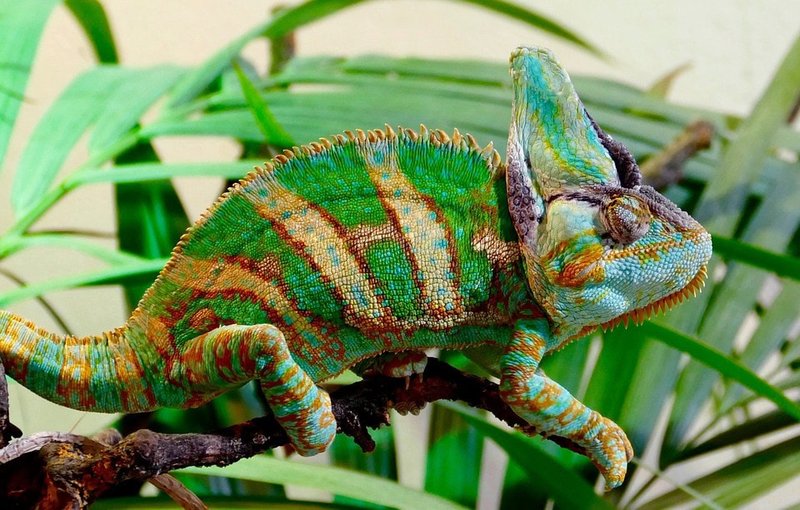
When we think about danger from animals, we often picture poisonous snakes or aggressive big cats. Chameleons, on the other hand, don’t fit that mold. They’re small, shy, and prefer to avoid confrontation whenever possible. But it’s important to understand their nature and behaviors to answer this question fully. Let’s dive into what makes chameleons unique and whether they can indeed be dangerous.
Understanding Chameleon Behavior
Chameleons are primarily solitary animals. They thrive in the wild by blending into their surroundings, which helps them avoid predators and catch prey. This natural camouflage is one of their most impressive traits; it’s almost like wearing a suit of invisibility! Because they are not social creatures, they don’t usually like to be handled or approached quickly. If you’re thinking about getting one as a pet, this is an important factor to consider.
When threatened, a chameleon may hiss or puff up its body to appear larger. This isn’t aggression per se, but rather a defense mechanism. They would much rather escape than attack. If we put ourselves in their shoes—er, scales—it’s easy to see why they act this way. Imagine feeling scared in a foreign environment; you’d probably want to hide, too.
The Risks of Handling Chameleons
While chameleons are generally not dangerous, improper handling can lead to situations where they might bite. This is rare, but it can happen if they feel cornered or scared. Their bites are not venomous and usually result in nothing more than a minor scratch, but let’s be honest: it can still hurt! If you’ve ever been nibbled by a small pet, you know that even tiny teeth can leave a mark.
If you’re new to reptiles, be sure to approach a chameleon with care. Always allow them to come to you rather than reaching in to grab them. A calm environment is key. If you want to handle a chameleon, start by letting it climb onto your hand gently, rather than forcing it. This builds trust and reduces stress for the animal.
Can Chameleons Carry Diseases?
Another concern when it comes to chameleons is the possibility of disease. Like many reptiles, chameleons can harbor bacteria and parasites, some of which might be harmful to humans. The most notable one is salmonella, which can cause gastrointestinal issues in humans if proper hygiene isn’t followed.
So, how do you protect yourself? If you have a chameleon as a pet, make sure to wash your hands thoroughly after handling it or cleaning its habitat. Regular vet check-ups are also crucial to catch any potential health issues early. Keeping your pet healthy not only benefits the chameleon but also minimizes the risk to you.
The Chameleon’s Diet: Safe or Dangerous?
If you’re thinking about adopting a chameleon, you might be curious about their diet. They primarily eat insects, and while this is not a direct threat to humans, it’s essential to know how to manage feeding safely. Some chameleons can be picky eaters, and that can lead to frustration.
When offering food, only provide crickets or worms that are gut-loaded and appropriately sized for your chameleon. Avoid placing your hand too close to the chameleon while feeding, as they might inadvertently bite your fingers if they mistake them for food. It’s more about understanding their instincts.
Chameleons and Allergies
While it’s not common, some people may have allergic reactions to chameleons or the substrate used in their enclosures. If you notice any unusual symptoms after exposure, such as itchiness or difficulty breathing, it’s worth seeking medical advice. Allergies can vary widely among individuals, so keep this in mind if you’re considering keeping one of these reptiles.
If you have friends or family members with allergies, think about how a chameleon might affect them before bringing one home. Allergies can be a serious matter, and understanding your environment is crucial for everyone’s safety and comfort.
So, can the chameleon be dangerous to humans? The short answer is: not really. They are more delicate than dangerous. While they possess some defensive behaviors, they generally prefer to avoid conflict.
However, keeping chameleons comes with responsibilities. Understanding their needs, handling them properly, maintaining cleanliness, and being aware of allergies will ensure a safe coexistence. Remember, these little reptiles are more about beauty and wonder than they are about causing harm. Enjoy their unique colors and behaviors, and they’ll be a delightful addition to your life!

